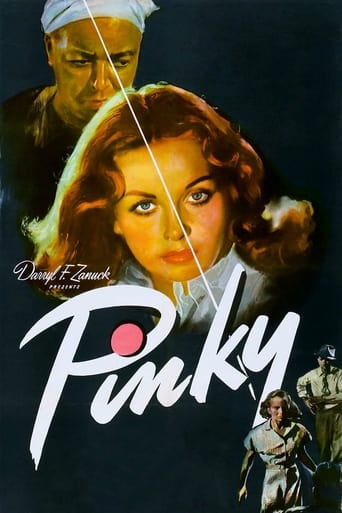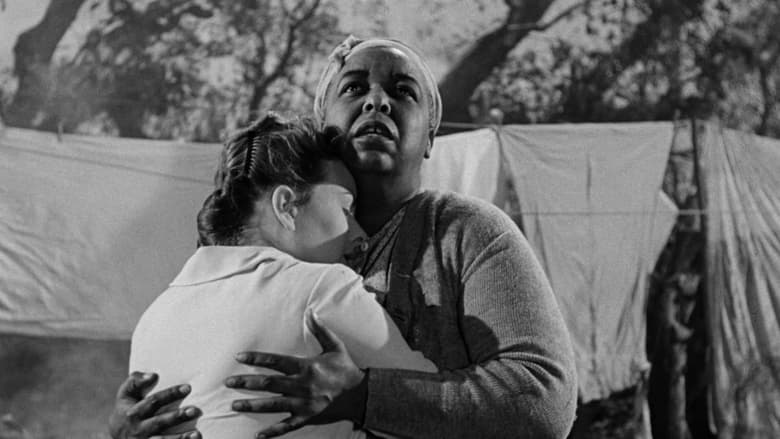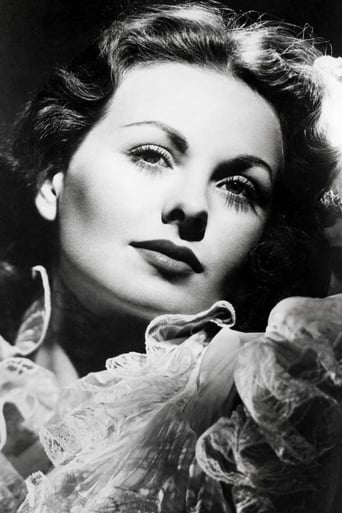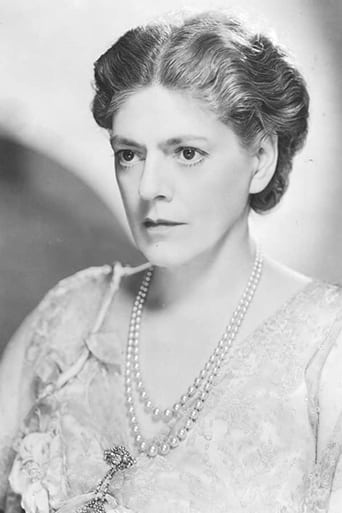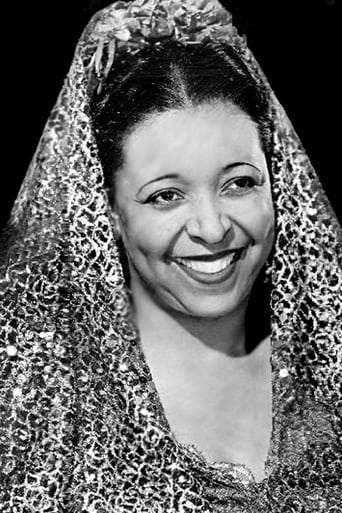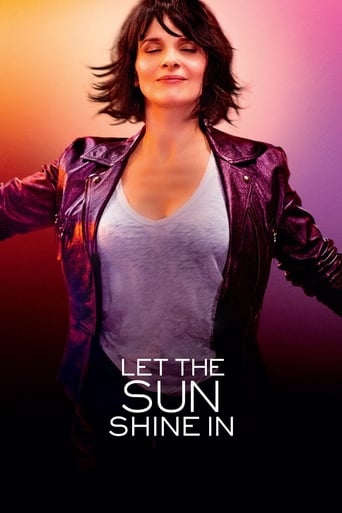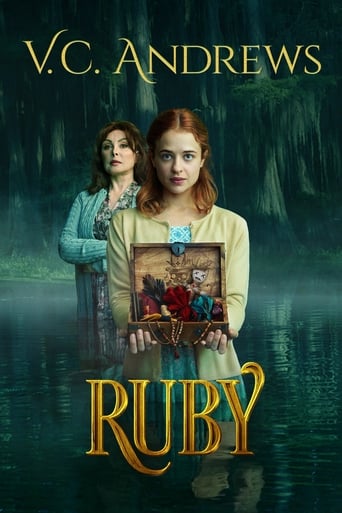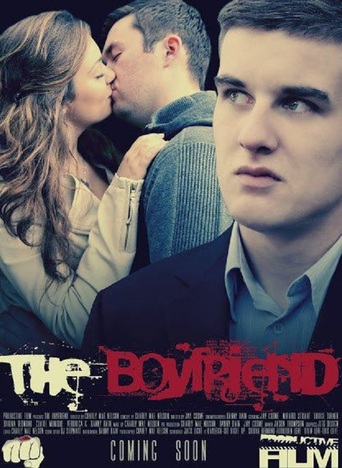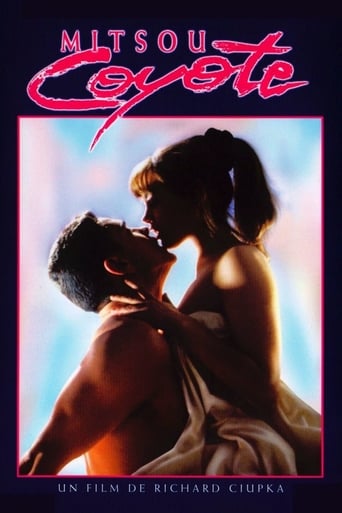Pinky (1949)
Pinky, a light skinned black woman, returns to her grandmother's house in the South after graduating from a Northern nursing school. Pinky tells her grandmother that she has been "passing" for white while at school in the North. In addition, she has fallen in love with a young white doctor, who knows nothing about her black heritage.
Watch Trailer
Free Trial Channels
Cast


Similar titles
Reviews
Good concept, poorly executed.
I like movies that are aware of what they are selling... without [any] greater aspirations than to make people laugh and that's it.
A bit overrated, but still an amazing film
All that we are seeing on the screen is happening with real people, real action sequences in the background, forcing the eye to watch as if we were there.
THE FILM: Pinky is not a particularly well-know film, and there are very few people who would indeed consider it to as a film that deserves to be well known. Pinky is the kind of film you watch because you are a fan of Elia Kazan. That said, an interesting fact I recently discovered about the film is that John Ford was originally appointed to direct the film, however, producer Darryl F. Zanuck fired Ford since he was unsatisfied on the constant delays he was getting from John Ford. Zanuck decided to call Elia Kazan who was in New York at the time. Kazan was not too fond of the screenplay, but he felt he owed Zanuck a favor as it was Zanuck who commenced Kazan's career in film. Lena Horne was initially hired to play the role of Pinky but the studio decided to go with Jeanne Crain instead as they wanted there to be no way to tell that Pinky was of African American decent. This was never one of Kazan's most popular films. It is currently considered to be his one of his lightest films, even though it is not a comedy and like all his films it is a commentary on American life.THE PLOT: Pinky is an African-American woman with light skin. After graduating from a North American nursing school she returns to her grandmother who lives in the South. We learn that when Pinky was in the northern part of the U.S. she did not divulge information of her African American decent to any of her colleges. To make matters more difficult, Pinky has fallen in love with an doctor who knows nothing of her African-American nationality. Pinky desires to leave the south immediately to return to the north where she can be treated properly. Her grandmother convinces her to stay so Pinky can nurse a wealthy white woman, Mrs. Em. Pinky agrees in resentment and she slowly begins to believe she is headed down the same road her grandmother went down.At first, tension is high between Pinky and Mrs. Em, but as time passes and Mrs. Em's state of health deteriorates they are met with a quiet but un-deniable respect and friendship. They soon realize how naive they were. Mrs. Em resented Pinky due to her black heritage and Pinky resented Mrs. Em because of how she treated 'Negroes'. This begins a very surprising and short-lived friendship that draws closure to racial barriers in Mrs. Em's life.THE CRITICISM: Pinky is a naive melodrama that does very little more than accept the fact that the world we live in is one of racial prejudice. Unlike the 1962 masterpiece, To Kill a Mockingbird, Pinky has a very childish view on racism. The best example of this is a spoiler. This is not a particularly amazing ending or a particularly amazing film for that matter, but should you desire to find watch this film, do not read on. In the end when Pinky abandoned the doctor she loved and turns Mrs. Em's mansion that she inherited into a nursing home for young black woman it presents the impossible situation of racism to be stopped by one person. It seems as if everything is right in the small Southern town after Pinky's action come through. I admire Kazan for trying to comment on a cause that certainly needed commenting on, but I wish he could have done it better. As well, this was among the first films to condemn racism. It is hard to believe that just 34 years before Pinky the film The Birth of a Nation was considered a cinematic masterpiece. The Birth of a Nation promotes the K.K.K.The following point was not a major issue for me, but I know it was a problem for several people who watched the film. Jeanne Crain is supposed to play an African-American woman. How did that happen? Yes, I understand that she is supposed to be Caucasian but it is still difficult to expand our disbelief. We know Pinky's parents are dead, perhaps they inter-racially bred? I have read reviews by average people who watched Pinky and could not get their head around the fact that Pinky was of African American heritage. Pinky would have worked more should Kazan had made an effort to at least find a resemblance between Pinky and her grandmother.I might as well add that the acting in Pinky was quite good on behalf of Jeanne Crain, Ethel Barrymore and Ethel Waters. However, I wish they had given us a little more time to witness the way in which the relationship between Pinky and Mrs. Em deepens.Pinky is not a terrible film. However I wish Kazan could have approached the subject of social and racial justice in a more honest manner instead of being so falsely inspirational. Pinky is a sugarcoated and heartwarming film where it should have been raw, aggressive and truthful to the way the world is.
Many movies do not hold up over the years, regardless of how well they are made, due to the times changing. But this movie tries too hard...it wants to be ground-breaking but does not want to offend the whites who are harboring their prejudices, so they try to please everyone, racist and liberals, and it comes off as entirely phony. Why make this movie at all, if you are going to cater to the racists in the end? Pinky is not a very sympathetic character and her doctor boyfriend even less so. He wants her, even after finding out she is part black, but only if she goes back to pretending she isn't. But of course, they can't end up together, because the audiences of the day wouldn't stand for it, even though the actors are both clearly white.I know the studios had to pander to the ridiculous censorship code, but I think they would have been better off not making films that so clearly are hamstrung by the "rules" of the code.Hollywood made some ridiculous movies over the years, with various white actors playing Pacific Islanders or Asians for part of the movie, only to later "discover" that they were really white, so they could have the white hero in the end. This is a kind of reverse, but comes off just as phony and stilted.Some of the acting is fine, but the script is so leaden, it hardly matters. And Jeanne Crain delivers too many of her lines from between clenched teeth in an effort to appear taut and simmering. It just looks stiff. She must know how ridiculous her casting was.I also know movie-goers of the day were used to the phony sets, but they play better in some movies than in others. This one looks as fake as can be the whole time.
I've never wanted to watch "Pinky" because of my own prejudices.Jeanne Crain? Beautiful but mediocre actress. (The weak link, so I thought, in "A Letter to Three Wives.") A film about racial predicaments circa 1949, falling between "Imitation of Life" (Claudette Colbert, 1934) and Lana Turner's (1959) and Douglas Sirk's classic glossy tearjerker of the same title? Who cares about "Pinky?" Turns out (now that I've seen it), like most prejudices, I was wrong about everything.It's all in the story and the script, as usual."Pinky" bypasses every sudsy cliché of "Imitation of Life" in either incarnation and proceeds directly to the heart of characters far more real, and a story far more incisive, deeply conceived and developed, than Edna Ferber or Ross Hunter ever imagined.The wonderful revelation of "Pinky," among many, is that Jeanne Crain could act.Elia Kazan's acute direction elevates Crain and everybody else. Ethel Waters, Ethel Barrymore, William Lundigan? The supporting players? Flawless.Shot and lit on sound stages, "Pinky" looks completely artificial by today's naturalistic standards. In its day, the studio stylization wasn't given a second thought. Painted cycloramas, fake Spanish moss, brilliant "mood" lighting, "classic" cinematography and all.Yet you're almost immediately lost and involved in the plot, which NEVER takes you where you expect.The entrance of Ethel Barrymore's character, for her brief duration in the story, is quietly amazing. Hers is the pivotal role upon which all else hinges. She realistically underplays every moment – only once ever leaving her deathbed.Even prone, as an actress, Barrymore makes mincemeat of the rest. Not a false note nor strained effect, nothing overwrought, no begging for sympathy . . . just the character. Listen to the simple naturalistic throwaway variety in her breathing and inflections! Same for Ethel Waters. Utter, believable simplicity and economy, always in character. Watch her eyes. (Offscreen and offstage, she could be a something of a monster, according to those who worked with her, though she always piously crossed herself before entering from the wings.) William Lundigan and every other supporting actor rises to the occasion.But it's Jeanne Crain who is the revelation. She was deservedly nominated for an Academy Award for this performance.Yes, she's beautiful. Yes, she's constantly artificially lit. Yes, she's photographed from all the right angles. But within those cinematic constraints of the times, she gives a truly honest, strong, intelligent and forceful performance as Pinky.As Ethel Waters' granddaughter, that's next to genetically impossible and implausible for Jeanne Crain. But she does it. You forget the "star" artifice in five minutes and she steadfastly carries the film. (Compare this to her somewhat "actory" though still delightful portrayal in "Letter to Three Wives.") "Pinky's" plot turns out to be far richer and more nuanced than the expected, "She passed for white," claptrap (still tear-duct manipulative and effective) of either version of "Imitation of Life."And no film explores to more devastating emotional effect the tragedy of race prejudice in the south than, "To Kill a Mockingbird." But "Pinky" is the adult, intelligent and perhaps best plotted, if not best scripted, of them all, because it eschews sensational interracial rape and murder ("Mockingbird") for more mundane but still heartbreaking human relationships and realistic consequences, given the period.It's a shame Jeanne Crain was never given an equal script or director to fulfill her talents.But there's "Pinky," and any actress would be proud.
Well-mannered nurse Jeanne Crain (as Patricia "Pinky" Johnson) returns to her poor "Black" neighborhood, in Mississippi. There, she is welcomed by washerwoman grandmother Ethel Waters (as Granny). The pair are confronted by racism both outside and inside their home. Most importantly, it is revealed that Ms. Crain has been "passing" as "White". Moreover, Crain has become engaged to Caucasian doctor William Lundigan (as Thomas Adams). While working at home, to support Crain's nursing education, Ms. Waters has grown close to ailing Ethel Barrymore (as Miss Em). At first, Crain does not understand or accept the friendship between Waters, a former slave, and Ms. Barrymore, a former plantation owner. But, for her grandmother, Crain agrees to become Barrymore's nurse."Pinky" is a nerve-rattling classic.Probably, the most obvious "debate" point was the casting of Crain in the title role. Crain was definitely "pink" enough (or, white-looking); but, her general "movie star" persona makes the casting decision seem risky. Yet, Crain, under Elia Kazan's direction, triumphs. There are so many ways Crain could have fallen into acting traps - she could have used mannerisms, make-up, and/or other stereotypical devices to "camp" up the "Black" - but, she avoids each trap. Crain performs the role with a great amount of dignity. She was deservedly honored with an "Academy Award" nomination.Barrymore and Waters also perform well (as you might expect).We are never, in the film, given a clear statement of facts regarding the heritage of Crain's "Pinky". My guess is that she is related, by blood, to both Waters and Barrymore. An attempted rape of Crain's character accounts, arguably, for her pink appearance; this might have occurred in more than one generation. It's also possible that a loving "mixed race" relationship was part of either Ethel's past. Making the "Black/White" history more clear would have only gotten the film into more trouble."Pinky" was quickly censored, and headed for the US Supreme Court.One of the Board of Censors' objections was, "a white man retaining his love for a woman after learning that she is a Negro." However, Mr. Lundigan's "Thomas" is only willing to retain his love under certain conditions; and, this leads to a sharp, less "Hollywood"-styled ending. The Supreme Court was correct. Some of the film's best scenes show the way Crain is treated after other characters learn she is not white. ********* Pinky (9/29/49) Elia Kazan ~ Jeanne Crain, Ethel Barrymore, Ethel Waters, William Lundigan

